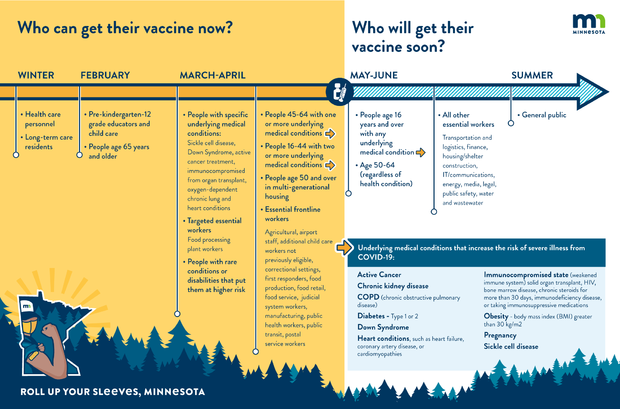Weeks Ahead Of Schedule, COVID Vaccine Rollout Expanding To Include 1.8 Million More Minnesotans
ST. PAUL (WCCO) -- Minnesota Gov. Tim Walz announced Tuesday that the state is expanding vaccine eligibility to include 1.8 million people with underlying health conditions and essential workers weeks ahead of schedule.
Minnesotans in the next two phases of the rollout will be eligible for the vaccine beginning Wednesday. State officials set a goal of vaccinating 70% of Minnesota seniors 65 and older before allowing more people to get the vaccine, a benchmark originally anticipated for the end of March before a boost in vaccines accelerated that timeline.
"We continue to ramp those up so that we don't have folks sitting on vaccines," Walz said. "The next time I'm here to announce the next lane [of people eligible] that's in, that's basically the rest of Minnesota. That's how close we are."
But if seniors haven't yet received their doses but still want a shot, they are still eligible and remain a priority, Walz said.
Here is a breakdown of those in the next two groups, which total 1.8 million people:
Phase 1b Tier 2
- Minnesotans with specific underlying health conditions: Sickle cell disease, Down syndrome, those in cancer treatment or immunocompromised from organ transplant, oxygen-dependent chronic lung and heart conditions.
- Targeted essential workers: Food processing plant workers.
- Minnesotans with rare conditions or disabilities that put them at higher risk of severe illness.
Phase 1b Tier 3
- Minnesotans age 45 years and older with one or more underlying medical conditions identified by the Centers for Disease Control.
- Minnesotans age 16 years and older with two or more underlying medical conditions.
- Minnesotans age 50 years and older in multi-generational housing. These are defined as homes where people from two or more generations reside, such as an elder and grandchild.
- Essential frontline workers: Agricultural, airport staff, additional child care workers not previously eligible, correctional settings, first responders, food production, food retail, food service, judicial system workers, manufacturing, public health workers, public transit, and U.S. Postal Service workers.
While the state on Tuesday announced vaccination of both groups, Minnesota Health Commissioner Jan Malcom said the tier two group will be the first priority in the next phase since they are more at risk for severe illness. Those in tier three should wait for the vaccine connector, their employer or their provider to notify them of when they can get their shots.
Food processing plant workers and people with specific high risk conditions total about 80,000, Walz said, with an additional million more people in the other group.
Malcolm estimated it would take 10 days to complete vaccinations of Minnesotans with high-risk conditions; two weeks for food processing plant workers; and four to weeks for Minnesotans with other health conditions and additional essential workers.
At current pace—a conservative estimate that does not account for potential surges in vaccine supply in the coming weeks—the state would again expand eligibility at the end of April.
"I think the Biden administration's promise to us that everybody wants a shot can get it by the end of May, I think that's going to even speed up more," Walz said.
More than one million Minnesotans have received at least one dose of the vaccine and more than 600,000 are fully vaccinated, according to the state's vaccine data dashboard. Johnson & Johnson's single-dose vaccine arrived in the state last week, a key to accelerating the rollout.
Walz says Minnesotans can start 'planning June weddings;' guidance on fans at Twins opener coming soon
In wake of the announcement about expanded vaccine eligibility, Minnesota House Republicans on Tuesday renewed their calls on the governor to roll back restrictions on businesses. They have previously urged a full reopening by May 1.
"We're simply asking him to follow the data and adjust Minnesota's restrictions to react to the improvements we've seen over the last several weeks," said House Minority Leader Kurt Daudt, R-Crown, calling Minnesota's protocol "by far the strictest" when compared to neighboring states.
He and others insisted businesses need time to plan and cannot be left in the dark.
Right now bars and restaurants are allowed to open at half capacity and wedding receptions and celebrations are capped at 50 people.
With Opening Day for the Minnesota Twins looming, fans are buzzing about the prospect of sitting in the stands. Walz said guidance about fans will be coming within in "days" and he is discussing further loosening restrictions. But he did not give a specific timeline, expressing caution about the U.K. variants circulating that sparked an outbreak in Carver County.
"We're on the verge of moving some of these things," Walz said. "And just to be clear, I think we would have been there last week without the emergence of a variant."
Other MLB teams have already announced fans will be allowed at the stadium but at reduced capacity. Twins officials petitioned the governor last month to allow 10,000 inside Target Field—25% of total seats—come April 8 for the home opener.




